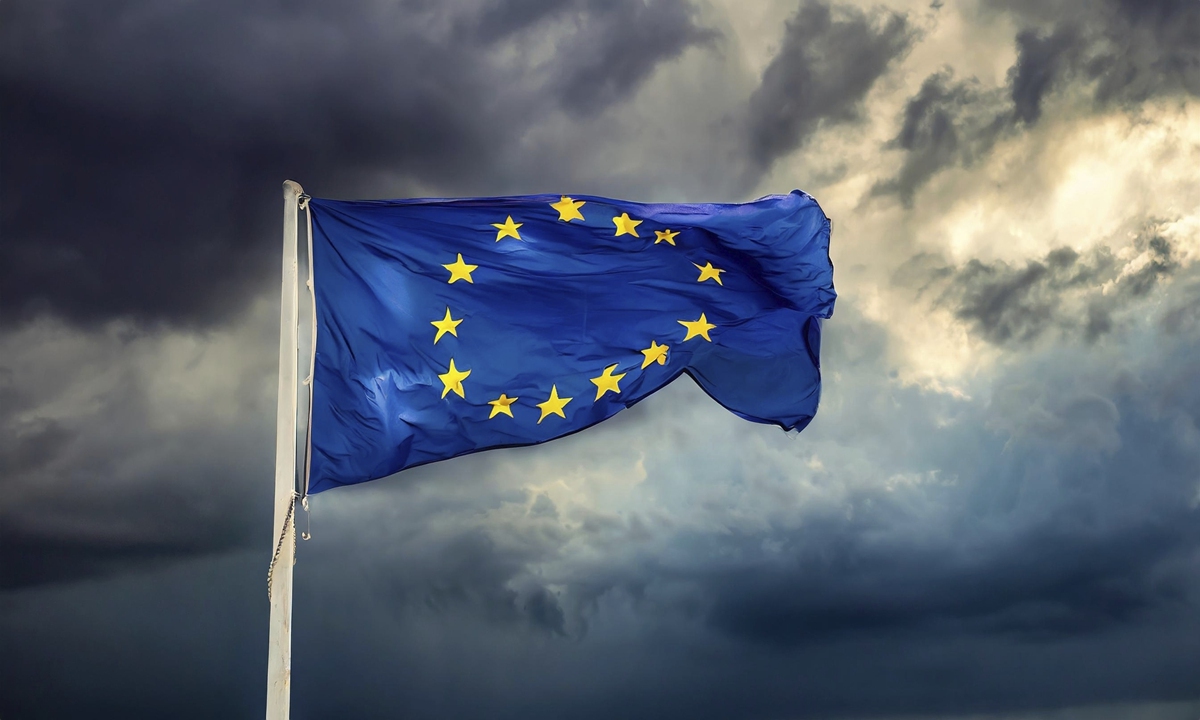
EU flag. Photo: VCG
Recently, the Aerospace, Security and Defence Industries Association of Europe reported that European defense companies have reaped significant dividends in recent years, largely driven by the war in Ukraine which has led to increased defense spending across Europe. The continent's defense industry grew by 16.9 percent last year, reaching revenue of nearly €160 billion (almost $170 billion).
Under the dual influence of geopolitical crises and industrial transformation, Europe had previously prioritized revitalizing industrial competitiveness and building capabilities in the green and digital sectors as key strategies for empowering economic recovery and shaping geopolitical strength. However, amid the ongoing Ukraine crisis and the EU's growing focus on strengthening military hard power, Europe's "war economy" has developed in recent years. EU institutions and some member states have also strongly advocated for increased defense spending and accelerated military procurement.
Since the Cold War, Europe had long enjoyed what is referred to as the "peace dividend." The relative decline in traditional military threats, coupled with reliance on NATO, had allowed EU countries to keep defense spending as a lower proportion of their economies, enabling more fiscal resources to be directed toward economic development or welfare construction. At the same time, the US has long pressured European countries to meet the NATO target of spending 2 percent of GDP on defense, which put significant pressure on Europe and led to a search for "strategic autonomy" among EU members.
However, amid Ukraine crisis, EU members have become more proactive in meeting the 2 percent defense spending target. The EU has continuously emphasized military preparedness. In March 2024, the EU introduced its first "European Defense Industry Strategy," which sets clear goals for increasing the proportion of the defense procurement budget and procuring at least 40 percent of defense equipment in a collaborative manner by 2030. The new EU Commission, led by Ursula von der Leyen, has made strengthening the defense industry a priority, calling for 500 billion euros ($529 billion) in foreign defense investment over the next decade.
It can be said that building and expanding the military-industrial sector is not only a crucial pillar of the EU's efforts to strengthen its military preparedness but is also deeply embedded in the bloc's ongoing "reindustrialization" process. The military-industrial economy could potentially become a key component in Europe's industrial development. In the context of Europe's current economic strategy adjustments, the defense industry has already assumed a prominent position. While the bulk of increased military expenditures in Europe over the past two years has gone toward purchasing US-made equipment, European defense companies are still reaping substantial profits.
However, for the EU, shifting its development logic from prioritizing regional economic cooperation to manufacturing weapons and fostering military-industrial strength may bring more harm than good, both in terms of enhancing industrial competitiveness and shaping the external environment.
First, from an industrial perspective, supporting the defense sector will inevitably crowd out funding for green and digital industries. The surge in defense budgets means the EU and its member states will face a shortage of funds to build competitiveness. Moreover, the lure of "quick money" from arms production could disrupt the environment and foundation for industrial investment and innovation in Europe.
Second, regarding the EU's development trajectory, an excessive focus on building the military-industrial sector risks diluting the EU's ethos of promoting peace and pursuing development. The interest groups emerging alongside the expansion of the military-industrial sector are expected to exert stronger influence and lobbying power on EU policies both domestically and internationally. This could push the EU's industrial, trade and diplomatic strategies further toward securitization and militarization, saddling its efforts to foster recovery and strengthen competitiveness with a heavy burden of security costs.
Third, the growth of Europe's defense industry and spending may alter its mentality to international and regional security issues, potentially leading to a greater reliance on military force and zero-sum thinking in addressing challenges. The result would risk transforming the EU from a stabilizing force in global affairs into a potential source of international instability.
The author is an associate research fellow at the Institute of European Studies, China Institutes of Contemporary International Relations. opinion@globaltimes.com.cn




